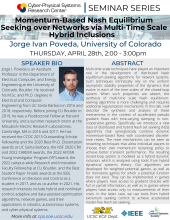Momentum-Based Nash Equilibrium Seeking over Networks via Multi-Time Scale Hybrid Inclusions
Momentum-Based Nash Equilibrium Seeking over Networks via Multi-Time Scale Hybrid Inclusions
Abstract
Multi-time scale techniques have played an important role in the development of distributed Nash equilibrium-seeking algorithms for network systems. Such techniques intrinsically rely on the uniform asymptotic stability properties of the dynamics that evolve in each of the time scales of the closed-loop system. When such properties are absent, the synthesis of multi-time scale Nash equilibrium-seeking algorithms is more challenging and requires additional regularization mechanisms. In this talk, I will describe the synthesis and analysis of these mechanisms in the context of accelerated pseudo gradient flows with time-varying damping in non-cooperative games. Specifically, we introduce a new class of distributed and hybrid Nash set seeking (NSS) algorithms that synergistically combine dynamic momentum-based flows with coordinated discrete-time resets. The reset mechanisms can be seen as restarting techniques that allow individual players to choose their own momentum restarting policy to achieve better transient performance. The resulting closed-loop system is modeled as a hybrid dynamic inclusion, which is analyzed using tools from hybrid dynamical system's theory. Our algorithms are developed for weighted potential games, as well as for monotone games for which a potential function does not exist. They can be implemented in games where players have access to gradient Oracles with full or partial information, as well as in games where players have access only to measurements of their costs. In the latter case, we use tools from hybrid extremum seeking control to achieve accelerated model-free Nash set seeking.
Bio
Jorge I. Poveda is an Assistant Professor in the Department of Electrical, Computer, and Energy Engineering at the University of Colorado, Boulder. He received his M.Sc. and Ph.D. degrees in Electrical and Computer Engineering from UC Santa Barbara in 2016 and 2018, respectively. Before joining CU Boulder in 2019, he was a Postdoctoral Fellow at Harvard University, and a summer research intern at the Mitsubishi Electric Research Laboratories, Cambridge, MA in 2016 and 2017. He has received the CCDC 2013 Outstanding Scholar Fellowship and the 2020 Best Ph.D. Dissertation awards at UC Santa Barbara, the NSF 2020 CRII and 2022 CAREER awards, the 2022 AFOSR Young Investigator Program (YIP) award, the 2022 campus-wide Research and Innovation Faculty Fellowship at CU Boulder, and the Best Student Paper Finalist awards at the IEEE Conference on Decision and Control as a student in 2017, and as co-author in 2021. His research interests include hybrid and nonlinear control, adaptive and data-assisted optimization algorithms, network games, and their applications in robotics, autonomous systems, and cyber-physical systems.


